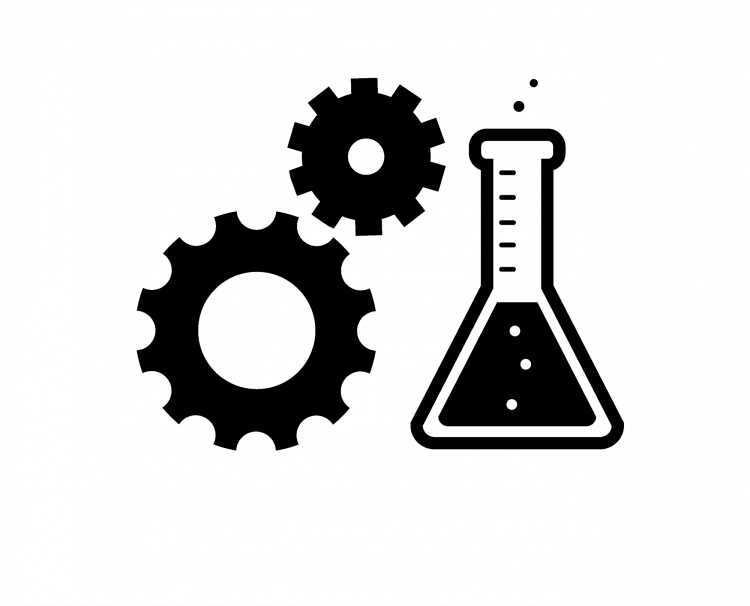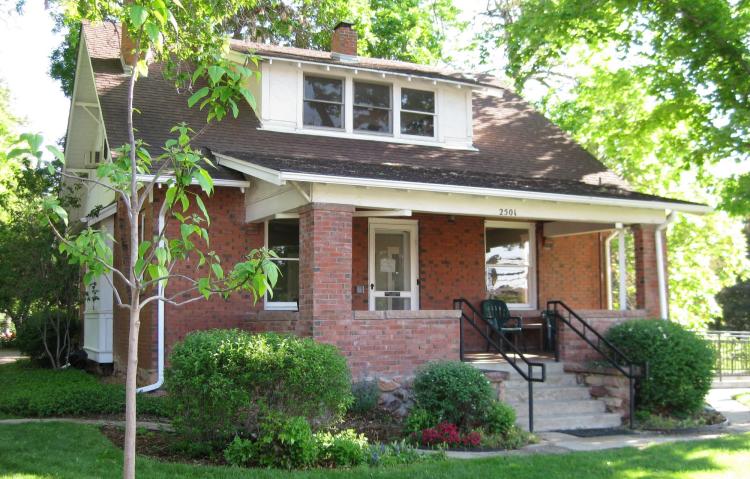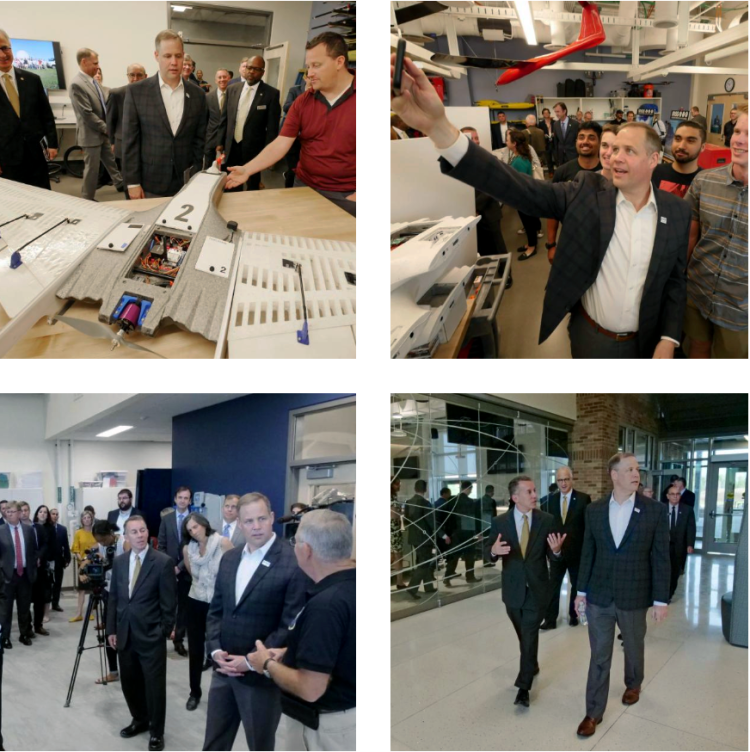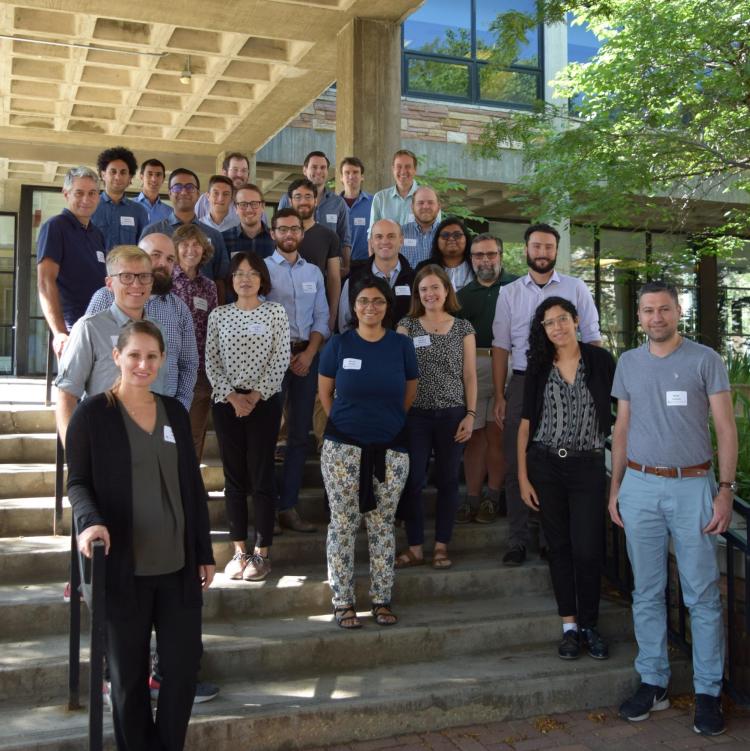
Johnson returns to her roots

For the second installment of the Dean’s Speaker Series, Bobby Braun sat down for a chat with Kristina Johnson, chancellor of the largest university system in the nation (State University of New York) and a former Obama appointee in the U.S. Department of Energy. The two discussed her experiences as an entrepreneur, her leadership philosophy and much more before an engaged crowd of students, faculty and alumni on May 1.
Johnson, who is a former faculty member in the Department of Electrical, Computer and Energy Engineering at CU Boulder, also took time to visit her old stomping grounds during a meet-and-greet with the Women in ECEE student group, in addition to sharing her experiences with students during lunch in the BOLD Center.
During her chat with Braun, she looked back on some of her accomplishments at CU Boulder, including co-founding the Optoelectronics Computing Systems Center in the late 1980s. She said she still remembers how it felt to be well-established as a researcher for the first time.
“Today I was asked by a faculty member, ‘What was the best part of your career?’” she said. “And I have to say, it was 1993–95, after we got the labs up and running, and we had graduate students. I got tenure, and I just really embraced it and ran with it.”
Keeping your eye on becoming an engineer and facing that initial barrier and being resilient and persistent – after that, you can do anything.
During the Q&A portion of the evening, an undergraduate student asked Johnson how she remains so versatile as an entrepreneur, educator and leader. She credited her engineering education.
“Engineering is hard – at least I found it hard,” Johnson said. “So keeping your eye on becoming an engineer and facing that initial barrier and being resilient and persistent – after that, you can do anything.”
Lobby named in recognition of couple’s scholarship gifts

The Engineering Center holds fond memories for CU Boulder alumni Ashok Srivastava and Lynn Waelde. The couple met while working on their PhDs and spent hours writing their dissertations together over coffee in the lobby. So it’s fitting that, in recognition of the couple’s recent gift to the College of Engineering and Applied Science, the lobby was designated the Srivastava-Waelde Engineering Lobby on April 25.
The gift from Srivastava (ElEngr’91, M’93, PhD’96) and Waelde (MPsych’91, PhD’95) will support scholarships for students in aerospace, electrical and mechanical engineering or computer science who are involved in organizations promoting a diverse student body. Waelde is a professor at Palo Alto University and an adjunct clinical professor at Stanford University School of Medicine. Srivastava is a senior vice president and chief data officer at Intuit, where he is responsible for leading efforts in large-scale machine learning and AI across the enterprise.
Student team takes cybersecurity concept to national pitch competition

From left: Trevor Stanley, Chris Coffey, Will Shand, Cory Cranford and Gerano Montoya.
CU Boulder was among only six universities invited to present an innovative network security concept in June as part of Starts H4D, a pitch competition for cutting-edge national security solutions.
The group presented at Founders Fund, a leading venture capital firm in San Francisco, alongside teams from Stanford, the University of Southern California and Duke on projects including image recognition of drones, GPS jammer detection, innovative learning platforms and IoT security.
The CU Boulder team included computer science graduate student Trevor Stanley, Leeds School of Business student Chris Coffey, applied mathematics master’s student Will Shand, Technology, Cybersecurity and Policy program master’s student Cory Cranford, and mechanical engineering master’s student Gerano Montoya.
Their team, CharIoT (Characterizing the Internet of Things), developed a new machine learning approach for identifying different kinds of internet-enabled devices on a network.
New space for entrepreneurial collaborations is underway
Our students need more than technical knowledge to impact today’s increasingly complex society.
Business and engineering leadership, students and friends celebrated the official groundbreaking on June 5 of a $45 million addition that will physically connect the two CU Boulder academic and research powerhouses.
In 2020, the Koelbel Building, which houses the Leeds School of Business, will be physically connected to the Engineering Center. The 45,000-square-foot addition will feature a 200-seat auditorium and an innovation and entrepreneurship hub, where students from any discipline can collaborate with faculty and local business leaders to explore new ideas.
Engineering Dean Bobby Braun said a permanent hub to support entrepreneurial collaborations will help create the jobs of the future.
“Our students need more than technical knowledge to impact today’s increasingly complex society,” Braun said. “Our recent growth in entrepreneurial activities, built upon expanding partnerships across campus and the state, demonstrates the value of well-rounded students with critical thinking skills and hands-on expertise.

Regents approve new biomedical engineering degrees

Good news for students looking to pursue careers in the biomedical industry: New undergraduate and graduate degrees in biomedical engineering could launch as early as fall 2020.
The CU Board of Regents approved the new degrees in the College of Engineering and Applied Science in June. Through these bachelor’s, master’s and doctoral degrees, students will have the chance to pursue classes from across the university, across engineering, and in biology and mathematics. The goal, organizers say, is to tap into a medical world that increasingly gears treatments to individuals and depends on rapidly evolving technologies.
The degrees are the first of their kind in the CU system, and no other university in the state offers a stand-alone undergraduate degree in biomedical engineering.
Herbst celebrates 30th anniversary with new name
 Herbst Lesser House
Herbst Lesser House
Thirty years ago, a gift from Clancy and Linda (Vitti) Herbst created the Herbst Program of Humanities in Engineering. Since then, the program has been committed to helping students develop a personal sense of responsibility as the basis for lifelong private and professional integrity.
After deliberations among the Herbst faculty and stakeholders, the program has decided to update its name to better reflect its scope and mission. The program will now be known as the Herbst Program for Engineering, Ethics and Society.
Herbst courses challenge students to apply intellectual rigor to the ethical and social complexities of being engineers. In the past, the program was known by the humanities, whose rich and varied works have helped students explore these complexities. The new program name reflects those complexities themselves: the nexus of engineering, ethics and society.
Ball Corp. gift will support scholarships, new aerospace building
Two recent gifts from Ball Corp. and its foundation will support the new Aerospace Engineering Sciences Building and scholarships for diverse students through the BOLD Center.
“Ball Corporation is a leader in so many ways in our community, and we’re thankful for their partnership in developing the workforce of the future,” Dean Bobby Braun said. “Ball embodies the term ‘good corporate citizen.’ In addition to its generous financial support, the company’s leadership and employees are committed to volunteering, and advising our students and faculty.”
CU partners with Ball in many ways across the campus, including with senior engineering design. The company also has a strong recruiting and professional development presence on campus, including career and internship fairs, networking events, activities during National Engineers Week and a mentoring program through the BOLD Center.
“We are pleased to support a strengthening and expansion of aerospace engineering sciences and look forward to the impact it will make for the students, faculty and the pipeline of talent for industry,” said John Hayes, Ball chairman, president and CEO. “We are committed to working with CU to develop this talent through our scholarship support and mentoring of students by Ball employees.”
 An aerospace student works in the PILOT lab in the new Aerospace Engineering Sciences Building on East Campus
An aerospace student works in the PILOT lab in the new Aerospace Engineering Sciences Building on East Campus
VIDEO: NASA Administrator Jim Bridenstein Q&A with CU Boulder students
On Aug. 23, NASA Administrator Jim Bridenstine visited CU Boulder where he toured the university's new Aerospace Engineering Sciences Building.
During a whirlwind visit to campus, NASA Administrator Jim Bridenstine toured CU Boulder's new Aerospace Engineering Sciences Building, the new home of the Ann and H.J. Smead Department of Aerospace Engineering Sciences. This roughly 175,000 square-foot facility will house researchers designing the next generation of toaster-sized satellites, hypersonic planes and more. Read full story >
Photo Gallery

Photos by Casey Cass/CU Boulder.
 Leading With Impact
Leading With Impact
Alumni event puts spotlight on cybersecurity
The college held its first Leading With Impact alumni speaker series events this spring in California’s Bay Area, focusing on a hot topic: cybersecurity.
“There is a lot of energy in that field here at the college right now because of the newly reorganized and named Technology, Cybersecurity and Policy program,” said Kevin Lobdell, the college’s director of alumni engagement. “This event tapped into that, showing the interdisciplinary nature of the work and showcasing how the college is leading in many ways.”
Lobdell’s team organized the event, which brought together alumni, faculty, staff and friends over the course of two evenings in Palo Alto and San Francisco in June. While there were built-in networking opportunities, the event featured a panel discussion on how CU Boulder researchers are anticipating and preventing cybersecurity risks, and how the TCP program is addressing a shortage in the cybersecurity workforce.
Panel speakers included TCP Program Director Dan Massey, incoming computer science Associate Professor Nolen Scaife, and Colorado Computer Science Teachers Association President Bobbie Bastian.
Manasa Suresh, a 2019 graduate of the TCP program, said she really enjoyed the event.
“It was a great opportunity to meet folks who are experts in the field of networking and security,” she said.
Lobdell said the college will host other Leading With Impact events with different themes in the coming year. While locations are still being confirmed, one likely location is Denver.
“There are lots of alumni watch parties for games, but this is an educational way to complement and share the impact the college is having in the world right now and build connections between alumni,” he said.

New faculty

New faculty attending Faculty Orientation 2019
CU Engineering has hired 66 tenure-track faculty and more than 35 instructional faculty members in the past three years – a hiring rate almost unheard of in higher education.
“We’re very excited to see how this new group innovates in research and teaching at CU Boulder,” Dean Bobby Braun said.
Twenty-nine percent of the tenure-track hires were women, and 23% were hired at the associate professor level or above, meaning they already had a few years of teaching and research under their belts.
Faculty members have been hired for both department-level positions and in new interdisciplinary searches that represent focus areas where the college is looking to build capacity. This year, that included hypersonics, quantum information systems and imaging science.
The college’s efforts to increase diversity among faculty and students has resonated with candidates, said Joann Silverstein, associate dean for faculty development. The opportunity to innovate in teaching and the interdisciplinary nature of the campus and college was also a big draw.
Hope Michelson is joining mechanical engineering as an associate professor in 2020 after spending 20 years at Sandia National Laboratory. At Sandia, she said, most of her collaborations were with people outside her institution, so she’s looking forward to more face-time with her fellow faculty.
“The department is extremely collaborative and super friendly,” said Michelson, whose research focuses include soot formation during combustion and black carbon evolution in the atmosphere. “I’m really looking forward to having those kinds of relationships at work.”
While she will be relatively new to teaching, the ability to work with the next generation of engineers was part of the attraction to CU Boulder.
“I’m really excited about working with students and having that new, fresh energy and a different perspective on things,” she said.
Giving: A year of generosity
The College of Engineering and Applied Science led the campus in fundraising efforts during fiscal year 2018. Thank you to all of our alumni, donors and industry partners for your continued support!
I have a great job because of my CU education, so I thought giving back would be the best way to show my appreciation.
Total Gifts – 2,843
Corporate Donors – 216
Non-Alumni Donors – 312
Young Alumni Donors – 208
Total Donors – 1,836
I give back to CU because CU gave so much to me. I don’t do it for recognition – I do it to know that I am helping the college develop the next generation of leaders in engineering.
Heritage Society: A Lasting Legacy
Leaving a gift to the University of Colorado in estate plans or with a charitable life-income gift forever integrates your legacy with that of our transformative university. Your contribution provides the promise of a high-quality education to the next generations of students, empowering their success through outstanding teaching, learning, research, service and health care.
The University of Colorado established the Heritage Society to recognize and honor those who have shared their intentions to support CU through a planned gift, including provisions in a will or living trust, a beneficiary designation on a retirement
account or with a life-income gift, such as a charitable gift annuity or charitable remainder trust.
Our Heritage Society members provide CU Engineering with the long-term stability we need to provide scholarships to deserving students like Sarah and Wesley.
 Wesley Shen (left) and Sarah Foley
Wesley Shen (left) and Sarah Foley
$408,580Realized dollars from planned gifts, 2019
11 New Donorscommitted, for more than $14 million
Growing up in Taiwan then coming to this country was not an easy transition. Besides the language barrier and difficulties making friends, college tuition was also something to bear in mind. Receiving this award has made it much easier for me in the way that I don’t have to be working whenever I wasn’t doing schoolwork; I got to invest some of my free time in making new friends. Moreover, I got to participate in other extracurricular activities, such as being part of the Freshman Engineering Council and CU International.
Upon receiving this award, I’ve thought about giving back to the CU community one day as well. This day can come as early as the age of 30 or it could be something that I’ll leave behind, like how Eugene has done.
Wesley Shen
Eugene Carroll Scholarship recipient
This award allowed me to come out to Colorado to attend this excellent institution and study aerospace engineering. If it weren’t for generous gifts like these, I would not be able to travel from my home in Massachusetts to Colorado, or be able to afford the out-of-state tuition. As a first-generation college student of Irish immigrants, every penny helps make it possible to become the first engineer in my family, and I could not be more grateful to have this opportunity. Coming to Colorado allows me the chance to work for companies in the space industry that I never dreamed I could, such as Lockheed Martin, SpaceX and many more.
Sarah Foley
M. Jeanne Place Scholarship recipient









